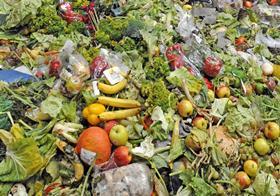
During the World Economic Forum in Davos last month, a coalition of 30 industry and public leaders launched Champions 12.3, an initiative aimed at action to reduce food loss and waste around the world.
The name comes from target 12.3 of the UN Sustainable Development Goals, which aims to halve per capita food waste and reduce food losses by 2030. While details of the coalition’s specific work are somewhat vague, it is very much about setting an example, identifying areas for improvement and encouraging others to follow the lead in cutting down on the staggering amount of edible products that are thrown away every day around the world.
Undoubtedly, there is huge momentum behind food waste reduction right now. In a debate in the House of Commons a fortnight ago, Rupa Huq, Labour MP for Ealing Central & Acton, raised the point that up to 40 per cent of UK fruit and vegetables are rejected before they even reach the shops because they do not meet minimum specifications, and challenged the government to ensure supermarkets and manufacturers transparently publish their food chain waste.
In response Rory Stewart, for Defra, said the government had recently held a roundtable with the retailers on the subject and was encouraging the food production industry to tackle the problem throughout the supply chain.
Several supermarkets have already grasped the nettle. Tesco – whose chief executive Dave Lewis chairs the Champions 12.3 initiative – set the standard in May 2014 when it became the first of the major grocers to publish data about food waste in its operations, as well as making a number of other significant steps including ending BOGOFs on fruit and veg in the UK, introducing food surplus donation programmes across its international network, and helping banana suppliers make use of their entire crop.
Asda, which has been one of the pioneers of so-called ‘wonky’ veg, has taken it a step further with a wonky veg box, filled with a range of irregular-shaped lines at a lower price than their conventional-looking counterparts. And Sainsbury’s has announced that it will phase out multibuy promotions in favour of lower regular prices.
The Co-operative has also been doing wide-ranging work, from relaxing specifications to reviewing shelf life and improving redistribution via FareShare.
Indeed, despite the inevitable focus on supermarkets, some feel the attention should be further down the supply chain. FareShare food director Mark Varney told business sustainability website Edie.net earlier this month: “Let’s stop talking about supermarkets. The focus should be on processors and manufacturers – there’s not enough research being done elsewhere in the supply chain.” He added that until there is financial incentive for manufacturers and processors to redistribute food, the problem will not be adequately tackled.
There is a sense that things are happening. A second reading of the Food Waste (Reduction) Bill, put forward by Labour MP Kerry McCarthy, is due in the Commons on 4 March. The bill would require secretary of state Liz Truss to make provision for a scheme to establish incentives to implement and encourage food waste reduction initiatives, as well as, notably, compelling large supermarkets, manufacturers and distributors to reduce their food waste by no less than 30 per cent by 2025, publish the levels of food waste in their supply chains and enter into formal agreements with food redistribution organisations.
Some of this work is already well underway, and voluntarily. But there is little doubt that what we have seen so far is just the tip of the iceberg in the war on waste, and nobody can afford to stick their head in the sand.
Opinion: We need lower specs
Farming involves a vast amount of science but it is not always an exact science, writes Jack Ward, chief executive of British Growers. There are numerous variables which affect the final outcome, with arguably the most significant variable being the weather. Producing crops to exacting specifications involving shape, colour, size and appearance is a challenging task. As consumers, we have been conditioned to expect near perfection but nature isn’t always so obliging.
Some of the recent publicity around waste has veered towards the alarmist end of the spectrum. From time to time, weather, markets and tight specifications conspire against producers and crops are written off. But in the majority of cases by developing a range of outlets with differing specifications, markets for most types of produce can be found, albeit offering a less sustainable price despite comparable production costs.
One area which could make a difference is in the relaxation of specifications in seasons when there is a problem. Some customers are prepared to relax their requirements when growers experience problems and this can make a significant difference to the percentage of crop reaching its intended destination. No-one is looking to make the level of investment required to produce fruit and veg and then see the product wasted. Minimising waste is a constant in the production process and the key to a successful business is being able to maximise the returns from every piece of fruit and veg by having a spread of outlets with differing specifications. And, of course, a market that is a little more understanding of the challenges of a weather-dependent activity and a little more accepting of something less than perfect would help too.



